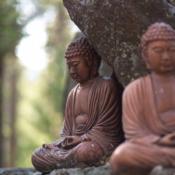 Let’s stop making mindfulness something other than what it is. Let’s stop making mindfulness the great cure-all. Let’s stop making mindfulness another gimmick to improve ourselves. Because it’s not.
Let’s stop making mindfulness something other than what it is. Let’s stop making mindfulness the great cure-all. Let’s stop making mindfulness another gimmick to improve ourselves. Because it’s not.
If we look clearly at the definition of mindfulness, we see that it is an inherent capacity in all of us—one that doesn’t need to be made into an object. It is our birthright. Simply put, mindfulness is a way of being aware of our ongoing present-moment experience with an attitude of nonjudgmental acceptance. It is the opposite of being distracted, yet you can be mindful of being distracted. It is the opposite of being on autopilot, yet after enough practice it becomes automatic.
Meditation practice supports mindfulness, but meditation is not mindfulness; meditation merely helps train the mind to be in a mindful state. Mindfulness doesn’t belong to anyone or any one tradition, although many meditative and contemplative traditions (particularly Buddhism) make it explicit in their practices.
Mindfulness is an ever-deepening way of being that can be understood only by living it.
What Is It, Really, to ‘Live in the Moment’?
As you become increasingly, continuously aware of yourself—with an attitude of wanting to know your experience deeply—your perceptions can change dramatically. What a gift to live life in such a way! If we can begin to rest in the mystery of not knowing what is going to happen next, we open to the possibility of living an exciting life of ongoing discovery and freshness. Even the most mundane activities can become rich, full of texture and volume, and we can experience them anew each time we encounter them.
It’s very easy to fall back into dullness and numbness, though, especially when our environment doesn’t support our aliveness. Also, depending on our current capacity to trust, our ability to open or stay open may be challenged. If we grew up in an abusive environment, we may have much more difficulty resting in the aliveness of not knowing, and we may experience this excitement as dread and anxiety.
The good news is trust can be developed. By repeatedly encountering our open, spacious, and restful nature through mindfulness, our organism begins to trust more and more in the process. Every time we experience true openness and get past the anxiety of not knowing, our nervous systems relax—and that relaxation is deeply nourishing for the parts of us that remain young and afraid.
If we are able to truly take in the relaxation, something deep in us transforms. This is not a one-time thing, but a continually deepening process.
Practicing Without a Goal
Mindfulness is not about becoming a better businessperson, a more focused worker, a more efficient human being, or even an enlightened person. Mindfulness is about becoming more intimate with yourself, more aware of your direct experience in a more alive way.
If you’re practicing mindfulness to increase your capacity to achieve something, it may indeed work. However, the real gift of mindfulness is deep intimacy with ourselves. When we are truly intimate with ourselves, our understanding of who we are can radically transform in ways we couldn’t imagine beforehand, and we can experience a sense of “me” that is not shaped by our history.
Some say it doesn’t matter what our initial motivation for practicing is; what matters is that one begins practicing. In my experience, this seems to be true. I’ll admit when I began practicing, my motivation was narcissistic in nature. I had all these ideas in my head of being some kind of “master of the mind,” becoming a better person, or getting to some marvelous state of mind. I didn’t realize back then that with that attitude, I was rejecting myself. By wanting to become someone other than who I was, I was rejecting who I was at that given moment.
No Two Paths Are the Same
We are each moving along our own path, and all the circumstances that have brought us to this moment are uniquely ours—which means that whatever supports our journey is also uniquely ours. Part of our path requires us to find for ourselves what it is we need to keep opening to it. Mindfulness helps us develop that sensitivity, in learning little by little how to truly live in the moment.
After many years of practice in conjunction with other forms of inner work, I can say that, for me, mindfulness boils down to simple, conscious acceptance of the immediacy of my experience—and that, in and of itself, is the reward of the practice.
When we first start practicing, we have no way of differentiating what is motivating us to do what we do. The more we become in touch with ourselves (in mind, heart, and body), the more we are able to tease apart our various motives and make decisions that are congruent with our deepest longings.
Paradoxically, however, we can’t do this alone; we need others on our journey. We need to feel our connections and rub against others to know ourselves. We also need the guidance of others who are further along the path.
After many years of practice in conjunction with other forms of inner work, I can say that, for me, mindfulness boils down to simple, conscious acceptance of the immediacy of my experience—and that, in and of itself, is the reward of the practice. Other benefits pale in comparison to savoring each changing moment of aliveness with its infinite subtleties and flavors.
Mindfulness doesn’t take away the anguish of being alive. The truth is that life has moments of pain for everyone, and what mindfulness does is give us the capacity, or container, to stay open in the midst of such pain. Even if we need to shut down because the pain is so intolerable, our mindfulness allows the process to go more smoothly.
We cannot expect to want to feel the goodness in our lives without also experiencing the pain. However, we can learn how to breathe through it, and with mindfulness and attunement to our own, unique needs, we can find what will support us in the process.

The preceding article was solely written by the author named above. Any views and opinions expressed are not necessarily shared by GoodTherapy.org. Questions or concerns about the preceding article can be directed to the author or posted as a comment below.

 Fat-Free Buddhism: Is Mindfulness Becoming a Religion?
Fat-Free Buddhism: Is Mindfulness Becoming a Religion? 8 Mindful Ways to Deal with Your Unpleasant Feelings
8 Mindful Ways to Deal with Your Unpleasant Feelings Thoughts, Emotions, and the Body: Mindfulness for Anxiety
Thoughts, Emotions, and the Body: Mindfulness for Anxiety

Please fill out all required fields to submit your message.
Invalid Email Address.
Please confirm that you are human.
Leave a Comment
By commenting you acknowledge acceptance of GoodTherapy.org's Terms and Conditions of Use.